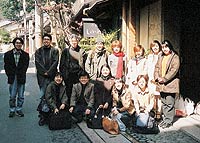This course covers the German cultural sphere, including Germany, Switzerland, Austria, and other Central European countries. Students in this major will not only study the German language but all aspects of German culture.
 The complex currents of German literary tradition first appeared in the 18 th century with works from great writers such as Goethe and the Grimm Brothers, followed by Thomas Mann and Brecht, and later enriched by the writings of German Jews like Kafka and Freud. In a broad sense, this literary “flow” denoted a social and cultural phenomenon and the changes of an historic German-speaking area in Europe. Discussion of these works would be impossible without knowledge of the politics, economics, religions, and customs of each era and region. Students will therefore consider the oral traditions of fables and märchen (fairy tales); facets of daily life such as clothing, food, consumption activity, and living space like room or house; and the mutual influences between media such as printed matter, pictorial images, and sound.
The complex currents of German literary tradition first appeared in the 18 th century with works from great writers such as Goethe and the Grimm Brothers, followed by Thomas Mann and Brecht, and later enriched by the writings of German Jews like Kafka and Freud. In a broad sense, this literary “flow” denoted a social and cultural phenomenon and the changes of an historic German-speaking area in Europe. Discussion of these works would be impossible without knowledge of the politics, economics, religions, and customs of each era and region. Students will therefore consider the oral traditions of fables and märchen (fairy tales); facets of daily life such as clothing, food, consumption activity, and living space like room or house; and the mutual influences between media such as printed matter, pictorial images, and sound.
In the first year, students build German language skills intensively and acquire basic knowledge about German culture and history needed for detailed readings of German literary works. Classes led by native German-speaking teachers refine students’ practical German proficiency. The department has also opened a special seminar where all department members participate and enhance their communication skills through discussion and presentations. Compared to others, the department is small, but therefore creates a good atmosphere of free discussion among students.
Professor
- MITANI, Kenji (Ph.D.)
- German Literature, Austrian Literature; Study on Modernism in Central Europe
- YOSHIDA, Kotaro (M.Lit.)
- German Literature and German Culture; Study on Cultural History in Eighteenth-Century Germany
